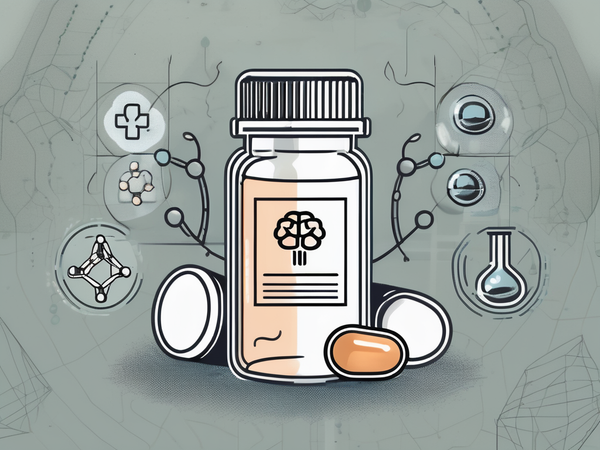Mind Matters: How Magnesium Influences Cognition
Magnesium is an essential mineral that plays a crucial role in various physiological processes in the human body. While many people are aware of its importance for maintaining bone health and regulating heart function, its influence on cognition and brain function is often overlooked. In this article, we will delve into the fascinating relationship between magnesium and the brain, exploring how this mineral impacts cognitive processes.
Understanding the Importance of Magnesium for Brain Function
Before we delve into the specifics, let's first understand why magnesium is essential for optimal brain function. The brain is one of the most energy-demanding organs in the body, requiring a constant supply of nutrients and oxygen. Magnesium, as an essential cofactor in numerous enzymatic reactions, helps facilitate energy production and supports the communication between brain cells, known as neurons.
Furthermore, magnesium is involved in the synthesis of neurotransmitters, the chemical messengers that are responsible for transmitting signals between neurons. This ensures proper cognitive functioning, including memory formation, learning, and attention.
The Role of Magnesium in Cognitive Processes
Research suggests that magnesium plays a vital role in enhancing cognitive processes. It has been found to support synaptic plasticity, which refers to the ability of synapses (connections between neurons) to adapt and strengthen in response to learning and experience. This plasticity is crucial for forming new memories, retaining information, and improving overall cognitive performance.
In addition, magnesium has been shown to have a positive influence on mood regulation. Adequate levels of magnesium have been associated with a decreased risk of depression and anxiety, promoting overall mental well-being.
Moreover, magnesium is involved in the regulation of sleep. It helps activate the neurotransmitters that promote relaxation and sleep, such as GABA. Sufficient magnesium levels can contribute to a better quality of sleep, which is essential for cognitive function and overall brain health.
The Impact of Magnesium Deficiency on Brain Function
Unfortunately, magnesium deficiency is relatively common, with estimates suggesting that a significant portion of the population may not meet their daily magnesium requirements. This deficiency can have profound effects on brain function.
Studies have shown that magnesium deficiency can impair cognitive function and lead to memory deficits. Individuals with low magnesium levels may experience difficulties in concentration, focus, and learning. Additionally, magnesium deficiency has been associated with an increased risk of age-related cognitive decline and neurodegenerative disorders, such as Alzheimer's disease.
Factors contributing to magnesium deficiency include inadequate dietary intake, excessive consumption of processed foods, certain medical conditions, and medications that interfere with magnesium absorption. Therefore, ensuring an adequate intake of magnesium-rich foods or considering supplementation may be beneficial, particularly for individuals at risk of deficiency.
In conclusion, magnesium plays a crucial role in supporting optimal brain function. From facilitating energy production and neurotransmitter synthesis to enhancing synaptic plasticity and mood regulation, magnesium is a key player in cognitive processes. However, magnesium deficiency can have detrimental effects on brain health, leading to cognitive impairments and an increased risk of neurodegenerative disorders. Therefore, it is important to prioritize magnesium intake through a balanced diet or supplementation to support brain health and overall well-being.
The Mechanism of Magnesium Penetration in the Blood-Brain Barrier
Now that we understand magnesium's role in brain function, let's explore how it penetrates the blood-brain barrier - a selective barrier that separates the circulating blood from the brain tissue.
The Blood-Brain Barrier: A Brief Overview
The blood-brain barrier is a highly complex and selective membrane that restricts the passage of substances from the bloodstream into the brain. Its main purpose is to protect the brain from potentially harmful molecules, pathogens, and fluctuations in nutrient levels.
However, certain essential substances, such as glucose, amino acids, and certain vitamins and minerals, including magnesium, need to cross this barrier to maintain optimal brain function.
Imagine the blood-brain barrier as a fortress, guarding the brain against intruders. It is made up of a network of specialized cells called endothelial cells, which are tightly packed together, forming a formidable barrier. These cells are connected by tight junctions, which prevent the passage of most substances, effectively sealing off the brain from the rest of the body.
But how does magnesium, an essential mineral for brain health, manage to breach this fortress?
How Magnesium Crosses the Blood-Brain Barrier
The mechanism by which magnesium crosses the blood-brain barrier is still not fully understood. However, emerging evidence suggests that various transport systems play a role in facilitating magnesium uptake into the brain.
One of the most well-known transporters is the transient receptor potential melastatin (TRPM) channels. These channels appear to be involved in regulating magnesium transport across the blood-brain barrier, ensuring an adequate supply to the brain.
Imagine these TRPM channels as gatekeepers, selectively allowing magnesium to pass through the blood-brain barrier. They are like tiny tunnels that open and close, tightly controlling the flow of magnesium into the brain. This intricate system ensures that the brain receives the magnesium it needs while keeping out potentially harmful substances.
Additionally, it is speculated that magnesium may utilize other transporters, such as the solute carrier family (SLC) transporters, to traverse the blood-brain barrier. These transporters are like secret passageways, hidden within the fortress walls, allowing magnesium to sneak through undetected.
Further research is needed to fully elucidate the precise mechanisms involved in magnesium's journey across the blood-brain barrier. Scientists are tirelessly working to unravel the secrets of this intricate process, hoping to unlock new insights into brain health and potential therapeutic interventions.
Magnesium and Its Role in Neuronal Protection
Aside from its influence on cognitive processes, magnesium also plays a prominent role in protecting neurons from damage and degeneration.
The Neuroprotective Properties of Magnesium
Magnesium possesses potent neuroprotective properties, shielding neurons from various insults and promoting their survival. It acts as an anti-inflammatory agent, reducing inflammation in the brain, which can contribute to neurodegenerative diseases.
In addition, magnesium helps regulate calcium levels within neurons. Proper calcium balance is crucial for cell signaling and preventing excitotoxicity, a process in which excessive calcium influx damages neurons and contributes to neurodegeneration.
Furthermore, magnesium acts as a modulator of glutamate, a neurotransmitter involved in learning and memory. By modulating glutamate release and receptor activity, magnesium helps maintain neuronal excitability within a healthy range and prevents excitotoxicity.
Magnesium's Impact on Neuronal Health and Longevity
Research suggests that magnesium deficiency may compromise the health and lifespan of neurons. Without sufficient magnesium, neurons may become more vulnerable to oxidative stress, inflammation, and other damaging processes, which can accelerate their degeneration.
Furthermore, studies have shown that magnesium supplementation can improve neuronal health and enhance neuroplasticity (the ability of neurons to adapt to structural and functional change), thereby potentially slowing down age-related cognitive decline and reducing the risk of neurodegenerative disorders.
The Role of Magnesium in Neurological Disorders
Given magnesium's influence on neuronal protection and cognitive processes, it is not surprising that this mineral also plays a role in various neurological disorders.
Magnesium's Influence on Neurological Disease Progression
Emerging research suggests that magnesium deficiency may contribute to the progression and severity of certain neurological disorders. For example, studies have linked lower magnesium levels with an increased risk of developing Parkinson's disease and multiple sclerosis.
Moreover, magnesium's role in modulating glutamate activity may be particularly relevant in disorders characterized by excessive glutamate release, such as epilepsy. Magnesium supplementation has shown promise in reducing the frequency and severity of seizures in some individuals with epilepsy.
The Potential of Magnesium Therapy in Neurological Treatment
Considering the impact of magnesium on brain function and its neuroprotective properties, there is growing interest in exploring magnesium therapy as a potential adjunct treatment for neurological disorders.
While further research is needed to establish optimal dosing, timing, and efficacy, preliminary studies have shown promising results. Magnesium supplementation has demonstrated potential in improving cognitive function, reducing symptoms, and enhancing quality of life in individuals with conditions such as Alzheimer's disease and migraine.
It is important to note that magnesium therapy should always be approached under the guidance of a healthcare professional, as individual needs and potential interactions with other medications or conditions may need to be considered.
Exploring the Link Between Magnesium and Dementia
As we age, the risk of developing dementia becomes a significant concern. Recent research has shed light on a potential link between magnesium and dementia, giving us further insights into preventive strategies.
Magnesium Deficiency and Its Relation to Dementia
Studies have suggested that magnesium deficiency may be associated with an increased risk of developing dementia, including Alzheimer's disease. Low magnesium levels have been linked to cognitive decline, memory impairment, and a higher likelihood of developing neurodegenerative disorders.
Reducing the risk of magnesium deficiency through proper dietary intake or supplementation may, therefore, hold potential benefits in preserving cognitive function and reducing the incidence of dementia.
The Potential Role of Magnesium in Preventing Dementia
While more research is needed, preliminary evidence indicates that maintaining optimal magnesium levels may play a role in dementia prevention. A balanced diet rich in magnesium-rich foods, such as leafy greens, nuts, seeds, and whole grains, can help support brain health and reduce the risk of cognitive decline.
However, it is worth noting that magnesium supplementation alone is not a guarantee against developing dementia. A holistic approach to brain health, including regular physical exercise, mental stimulation, and a balanced lifestyle, is key in maintaining cognitive function as we age.
Conclusion
The influence of magnesium on cognition and brain function is undeniable. From its role in facilitating cognitive processes and protecting neurons to its potential therapeutic applications in neurological disorders, magnesium is an intriguing mineral with vast implications for brain health.
Ensuring an adequate intake of magnesium through a balanced diet or targeted supplementation may help support optimal brain function, enhance cognitive performance, and reduce the risk of cognitive decline and neurological disorders.
As with any dietary or therapeutic intervention, it is always advisable to consult with a healthcare professional to determine individual needs and potential interactions.



























 DOWNLOAD NOW
DOWNLOAD NOW
